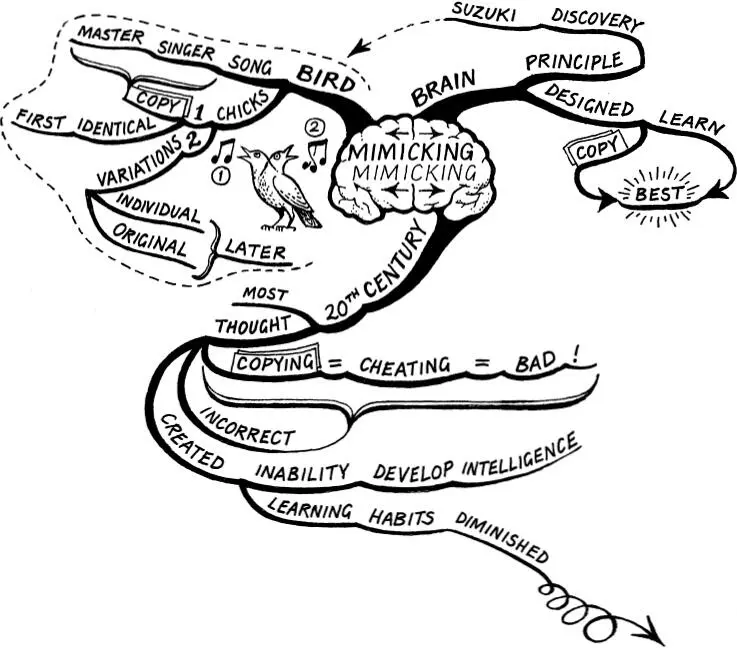Suzuki, in a delirium of enthusiasm for what he had realized, rushed around telling everyone he knew of his remarkable discovery: that every Japanese child learns to speak Japanese!
His friends and colleagues patted him on the shoulder, informing him rather firmly they were actually already aware of that. ‘But No! No!’ declared Suzuki, ‘they really do , and it’s amazing!’
Suzuki was correct. Like Newton before him, he had discovered something that was so obvious no one could see it – that any baby, born in any country, automatically learns, within two years, the language of that country.
This means that every normal baby’s brain is capable of learning millions of potential languages.
If you, dear reader, had been born in and lived for the first few years of your life in a totally different country from that you are familiar with now, your own baby brain would have absorbed that language as rapidly and fluently as you now speak your own main tongue.
If you, for example, were a Caucasian baby and had been born in Beijing, you would not have looked up with your little baby eyes and thought ‘Oh, Chinese. Far too complex for me! Think I’ll stay silent for the rest of my life!’
Not only would you have learned the language of that country, you would have learned the specific language sounds of the special area of that country in which you had been born – your accent.
What Suzuki had discovered was that the voice/ear/brain system was a virtually perfect copying machine, with an almost infinite capacity to learn the music (words and rhythms) of an infinite number of languages.
What’s more, it didn’t matter whether the language was Chinese, Portuguese, Music-ese, Maths-ese, Art-ese, Burmese, or Japanese. So long as a baby was given the right learning environment and proper encouragement, it could learn anything!
mimicking
What Suzuki had discovered was the Brain Principle of Mimicking. This principle states that your brain is designed to learn by copying the best of what it sees around it. If it is allowed to do this, it will be capable of ongoing learning at an accelerated rate.

For the bulk of the 20th century we incorrectly thought of mimicking as copying, copying as cheating, and cheating as bad. With this incorrect way of thinking, we created habits of learning that increasingly diminished our abilities to develop our intelligences, especially Verbal Intelligence.
We even came up with ridiculous assumptions to back-up this incorrect thinking, such as that once you are past the age of 10, the development of Verbal Intelligence becomes much more difficult, and that once you are past the age of 25 it becomes virtually impossible.
Nothing could be further from the truth.
By applying the principle of mimicking, as the songbird chicks do, and the additional knowledge you will gain from The Power of Verbal Intelligence , you will be able to increase your rate of vocabulary acquisition and word power at a pace that makes a baby’s seem embarrassingly slow by comparison!
play
When the baby is ‘at work’ dealing with the massive tasks of survival and learning, its main tool is Play.
Play is the method the universe has designed for allowing the brain to learn most easily.
How is this so?
Because play involves activity that is enjoyable, often amusing, and always imaginative. It usually involves physical activity, often vigorous and long, and demands that the brain makes new associations between things.
You will know that all babies love to play, especially with words. They roll them around in their mouths, often purposely mispronounce them to make them more interesting or funny, play with different variations and combinations of words and parts of words, change the pitch, speed, tone and volume of their voices, and are always curious about new words and their meanings and associations.
Unfortunately during the last two centuries learning has been made much more serious, and the element of play removed except in the classrooms of superb teachers. Even at the beginning of the 21st century this is still happening. In America some educators are leading a movement to eliminate play from schools altogether, including playtime. Their argument? That if you eliminate play and playtime, you will save time and get far better results from the young brains because they will be 100 per cent dedicated to ‘serious’ work. Such a policy is like saying that if we remove children’s legs their bodies would be lighter and therefore more mobile!
It is by applying the Brain Principle of Play that babies and children rapidly develop their Verbal Intelligence.
You can begin to see the implications for yourself …
love of learning
Another of the baby’s secret weapons in the development of its Verbal Intelligence is its boundless love of learning. This love is both led and fed by an insatiable curiosity.
The instant the baby’s brain asks the next question or wants to know the ‘next step’, all its senses open, and all its energies are immediately directed to the achievement of that answer; that goal.
This openness and focus are exactly what the brain needs to take in, understand and remember new verbal information.
‘The use of increasingly complex and sophisticated language structures, and the units (vocabulary) which make up those structures, is one of the defining characteristics of evolutionary advance and development. The training and nurturing of your skill in this area is your natural right, your own responsibility, and a rare opportunity. If you grasp it, it will provide you with exceptional benefits. Claim it. Accept it. Develop it!’
Tony Buzan
Ironically the baby’s love of learning is accompanied by something that most adults think is not acceptable or permissible, but which forms the foundation-stone in the development of Verbal Intelligence. It is the next ‘Baby Secret’.
making mistakes / ‘failing’
Does the baby make mistakes?
Yes!
More than the average adult learner?
Many more!
How can it be that a super-learner like the baby makes more mistakes than the average adult, who does not learn so fast?
Because the baby knows the secret: making mistakes and experiencing ‘failures’ is one of the fastest ways to accelerate your learning.
If you don’t make mistakes it means that you have not tried. If you do not try you will never learn.
The baby has hit upon the secret that if you combine your love of learning with creativity and taking risks, you will not only make more mistakes than most other people, you will have many more successes.
All research shows that the world’s great geniuses simply carried on using this Baby Success Formula. They wrote millions of words, painted millions of brush strokes, composed millions of notes, and formulated millions of ideas. They then discarded much of it, and kept the best!
‘Language is the dress of thought.’
Samuel Johnson
There is one other secret principle at which the baby is a world champion:
persistence
Combined with the love of learning and the making of mistakes, the baby realizes that without persistence, no progress is ever made.
Just think of how many times a baby sometimes tries to pronounce a complex word before getting it finally right; it is sometimes hundreds of ‘failures’.
Does the baby go into a sulk and think something like ‘What’s the point?! I’ve tried thousands of times and still can’t get this bloody word! This language-learning lark is too hard; it’s not for me – I give up!’
Читать дальше













